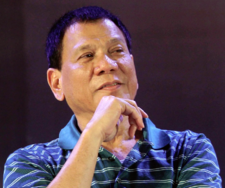Political career[edit]
Davao City mayor[edit]
See also: 1989 Davao hostage crisis
After the 1986 People Power Revolution, Duterte was appointed officer-in-charge vice mayor. In 1988, he ran for mayor and won, serving until 1998. He set a precedent by designating deputy mayors that represented the Lumad and Moro peoples in the city government, which was later copied in other parts of the Philippines. In 1998, because he was term-limited to run again for mayor, he ran for the House of Representatives and won as Congressman of the 1st District of Davao City. (under the Laban ng Makabayang Masang Pilipino coalition) In 2001, he ran again for mayor in Davao and was again elected for his fourth term. He was re-elected in 2004 and in 2007.[25]
Davao City under Duterte won the National Literacy Hall of Fame Award for being a three-time first-place winner in the Outstanding Local Government Unit, Highly Urbanized City category. In 2013, Davao City sent rescue and medical teams to Tacloban to give aid to the victims of Typhoon Haiyan, locally known in the country as Typhoon Yolanda. Financial assistance was also given to Bohol andCebu for the earthquake victims.[26]
One article of TIME magazine shows him patrolling in Davao City’s streets on one of his big motorcycles, leading a convoy complete with blaring sirens and M16 rifles. Local news reports show him foregoing the pomp, opting to inspect in a regular taxi, surprising his would-be passengers.[27]
Though vocally supportive of the extra-judicial killings of habitual drug users and dealers, Duterte used city government funds to build a ₱12-million drug rehabilitation and treatment center which provides 24-hour services. In 2003, he offered a ₱2,000 monthly allowance to drug addicts who personally approached him and committed to kick the habit. Duterte is also publicly known for visiting remote New People's Army camps negotiating peace transaction efforts and advocating diplomacy.[27]
Duterte was also the first mayor in the Philippines to give formal representation to the indigenous Lumad and Muslim community, designating deputy mayors to represent their interests in the local government. The anti-discrimination ordinance he mandated, was reportedly a response to news he received that Muslims were being discriminated against by real estate agents.[27]
In 2010, he was elected vice mayor, succeeding his daughter, Sara Duterte-Carpio, who was elected as mayor. He has been offered the Interior Secretary post 4 times, by presidents Fidel V. Ramos, Joseph Ejercito Estrada, Gloria Macapagal-Arroyo, and Benigno S. Aquino III but rejected all of them. In April 2014, he also declined a nomination for the World Mayor Prize, given by an international body to outstanding mayors saying "he was just doing his job."[27] Among the other awards Duterte also refused to accept for Davao City includes the one given by the American Cancer Society and the 2010 anti-smoking award in Singapore.[20]

